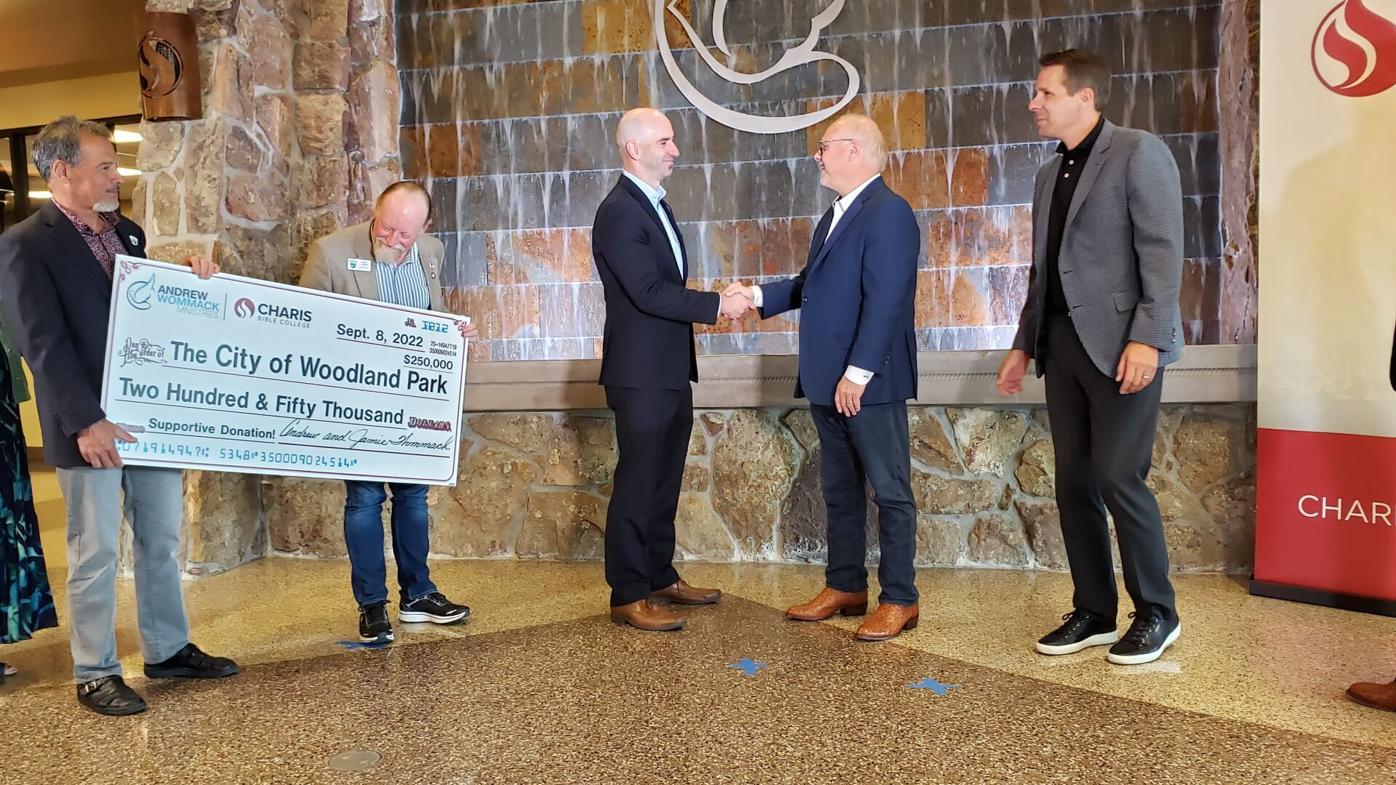Construction on Charis Bible College student housing starts same day ministry donates $250,000 to city

From left, Woodland Park City Council members Robert Zuluaga and Frank Connors hold the ceremonial check for $250,000 from Charis Bible College to city utilities, while City Manager Michael Lawson shakes hands with Andrew Wommack Ministries CEO Billy Epperhart and Senior Vice President Andrew Wertz looks on at a check presentation Thursday.
Debbie Kelley, The denver Gazette
WOODLAND PARK • Construction on apartments for Charis Bible College students started Thursday on the nearly 500-acre Andrew Wommack Ministries campus in Woodland Park, the same day the organization presented a “goodwill” donation of $250,000 to the city following a heated community dispute over the student-housing project.
Each 40-bed complex will cost an estimated $6.5 million to build, said Andrew Wertz, senior vice president for Andrew Wommack Ministries and Charis Bible College.
Bible college seeks to rescind decade-old agreement with city of Woodland Park
That amount is $1 million more per unit from November 2021, when Andrew Wommack, founder of the evangelical Christian organization and vocational Bible-training college, announced at a campus open house that the next building phase was about to begin.
The first four units still are expected to open in time for the 2023 fall semester, Wertz said. Wommack said last year he wants to erect as many as eight apartment buildings for students, depending on funding.
Construction has been delayed by five months, over terms city leaders placed on the idea a decade ago, when Wommack decided to develop a mega-campus in Woodland Park and relocate his college and organization headquarters from Colorado Springs to the small mountain town to the west.
A clause added after the ministry presented an original planned-unit development, known as a PUD, and received approval from City Council was at the center of the controversy.
The city had later inserted a requirement into the approved ordinance that the ministry privatize future student housing, which subjected intended dorm development to property taxes.
Andrew Wommack Ministries didn’t know that, CEO Billy Epperhart said in an interview on Thursday.
The organization has emails from 2012 regarding the PUD before the clause was added, he said, and subsequent objections later in 2012 and again in 2015, when its lawyer notified the city that the organization didn’t know the condition about taxes had been inserted and objected to it.
“The PUD just referenced a meeting that was held late at night with the mayor,” Epperhart said. “It didn’t say anything about student housing.”
The matter constituted an error on the part of City Council a decade ago, Wertz said.
The present-day council agreed on Aug. 4, approving in a 5-2 vote a request from Andrew Wommack Ministries to amend the PUD and remove the condition. The organization’s lawyer argued that because the ministries and Charis Bible College are nonprofit religious entities, they are tax-exempt and cannot by law be taxed.
The amount of the “one-time, nonbinding” donation to the city’s utilities department was an internal decision that organization leaders arrived at after studying the city’s needs, Wertz said.
Some wondered at last month’s City Council meeting why fire or ambulance districts weren’t also beneficiaries.
Those entities aren’t under the city jurisdiction, said City Manager Michael Lawson, adding that discussions about the city’s tax structure are ongoing.
Residents who objected to the proposed change to the PUD claimed the college, which enrolls about 1,050 students on site this semester and hosts numerous seminars with thousands of attendees, strains city infrastructure and services.
Since opening at the Woodland Park location in 2014, Charis has donated more than $800,000 in money, services and goods to local efforts such as food pantries, the fire district and the Teller County Sheriff’s Office, said Mike Pickett, a Bible college vice president. The sheriff’s office has received a horse trailer, stun guns and body armor, he said.
Lawson said the organization’s charitable contribution to the city coffers is nice because “it’s taking a step forward from a difficult political issue.”
Some residents have complained that the college has adversely affected traffic, housing affordability and availability, and the overall nature of the community.
The city’s housing shortage long predates the college’s arrival, said Debbie Miller, president of the Greater Woodland Park Chamber of Commerce, during a presentation to first-year students on Thursday. Miller said the lack of housing was a problem when she moved to the area in 2005, as she encouraged students to become a benefit to the community.
The city plans to spend the Charis donation on securing additional water rights, Lawson said, because “without water, you can’t grow.” City leaders are eyeing Twin Lakes Reservoir as a potential source for long-term supplies, he said.
Between 7,950 and 8,200 residents live in the city limits, according to varying counts by the U.S. Census Bureau and the State Demography Office, the Chamber’s Miller said.
Woodland Park’s growth has slowed in recent years and is limited by available water taps for new construction, Lawson said. The city this year has sold 29 water taps and has 51 remaining to sell, Miller said.
Building new student apartments is expected to alleviate concerns about the college contributing to the area’s housing crunch, officials have said.
“It has always been our desire to be a good neighbor, and I believe this donation is just one of many ways in which we can help assist Woodland Park during this time of continuous growth,” Epperhart said Thursday, in presenting the city manager with a ceremonial check.




